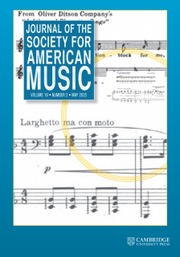No CrossRef data available.
Article contents
From Lumpy Gravy to Civilization Phaze III: The Story of Frank Zappa's Disenchantment
Published online by Cambridge University Press: 21 January 2011
Abstract
Among the vast recorded output of Frank Zappa's remarkable career, two albums—the very early Lumpy Gravy (1968) and the posthumously released Civilization Phaze III (1994)—have special significance, not only for their great originality but also for the conceptual link between them. A close examination of these works, together with recently issued audio-archival material that provides a basis for conjecture about the genesis of Lumpy Gravy, reveals much about Zappa's unique position in the realms of popular and art music as he negotiated the boundary between them. It also shows how and to what extent Zappa embraced an avant-garde aesthetic in Lumpy Gravy, his first solo album, and how this orientation was abandoned yet also, in a way, echoed in Civilization Phaze III.
- Type
- Research Article
- Information
- Copyright
- Copyright © The Society for American Music 2011


